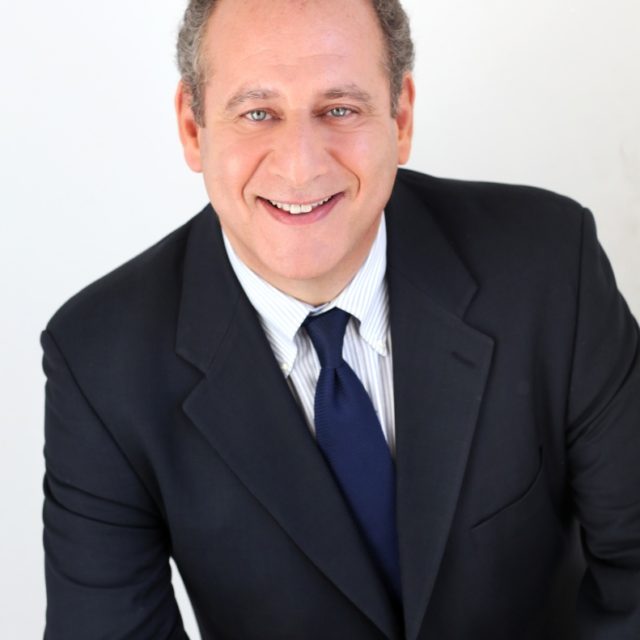Interview with David Phillips, Director, Program on Peace-building and Rights (Institute for the Study of Human Rights – Columbia University)-
By Ruben Avxhiu

–You’ve been involved with Albanian issues for many years, correct?
Yes, I visited Kosova in the late 1980s when Serbia declared martial law and implemented its policy of apartheid. As President of the Congressional Human Rights Foundation, chaired by Congressman Tom Lantos, we raised awareness about Serbia’s human rights abuses on Capitol Hill and with the executive branch.
When I directed the Task Force on the Western Balkans, a project of the Council on Foreign Relations, I met Slobodan Milosevic and proposed a US Information Agency office in Prishtine. When he accepted the proposal, it was a big deal for an American flag to fly in Kosova.
I worked closely with Richard C. Holbrooke to support NATO’s intervention. The decision to go to war did not come of the blue. It was the result of efforts over many years advocating Kosova’s cause with US policy-makers and opinion leaders.
Friends of Kosova, myself included, demanded recognition of Kosova as a sovereign and independent state. I had the good fortune to visit Pristine on February 17, 2009 – independence day – and join the festivities.
Kosova’s independence can never be reversed despite Serbia’s efforts to prevent Kosova from gaining greater global recognition. Mutual recognition can be achieved through more robust engagement by the United States in the Belgrade-Prishtina dialogue. It also requires more effective transatlantic cooperation between the US and the EU, including leading member states such as Germany, France and the UK.
Last week the new foreign minister of Kosova was in the United States. Next week, there will be a meeting of the leaders of Kosova and Serbia in Washington. An attempt to resume an interrupted US-led process of negotiations. Between the two of them, it seems like a good moment to take a look at the relationship between the two countries.
Dialogue is always preferable to conflict. But don’t expect any surprises at the meeting on September 4. Diplomacy is a process not an event. It will take time and more stringent pressure for Serbia to recognize that it lost Kosova as a result of Milosevic’s crimes.
You have been critical of the way the United States has handled this process. What is wrong with the US involvement here?
Nothing is wrong with US involvement. Lack of involvement is the problem. The EU facilitated 33 agreements between Serbia and Kosova. However, Serbia blocked implementation of many agreements. The US has enormous clout and can compel implementation. The US and the EU should conduct an implementation review to assess commitments. Moreover, Washington should focus on the big picture – a full and final agreement on mutual recognition.
Over the last decade, leaders of Kosova, again and again, have asked for a greater US role in the dialogue with Serbia. It is ironic that now that we have the attention of Washington, there is a lot of concern about where this might be going. Shouldn’t we simply trust US officials like we did in Rambouillet for example?
Ambassador Richard Grenell, the US Special Envoy for the Kosova-Serbia dialogue, is a bad actor. He’s no friend of Kosova. He’s also unqualified to serve as Special Envoy. Grenell knows nothing about the region. He wants a deal so that the Trump administration can claim a foreign policy success before the US election.
Has the US taken a balanced approach?
The US has lost its moral compass. We must not forget that the US went to war to rescue Kosova from Serbia’s aggression. The Trump administration is either ignorant about history or practicing moral equivalency. Serbia will remain a pariah state until it recognizes Kosova, pays reparations for stolen or damaged properties, and provides an accounting of 1,700 people still missing from the war. Redress is required. There can be no peace without justice.
Many Albanians have been critical of their leaders about how they handled the Washington-led process, but I try to view it also from their perspective. The support of the United States is crucial to Kosova’s very existence. Even Albin Kurti, who has been the most resistant, suspicious, and even critical of the new initiatives, practiced a careful acceptance of them during his short time in the office. How can a small and new country like Kosova handle this situation?
The US and Kosova have a special relationship. Americans have no better friends than Albanians anywhere in the world. For sure, every Kosova politician knows that the US plays an indispensable role in Kosova’s security and state-building. Support for Kosova is non-partisan. A Democrat, Bill Clinton, launched NATO’s action. A Republican, George W. Bush, helped Kosova’s coordinated declaration of independence. Today, bipartisan and transatlantic cooperation is needed to resolve the Kosova issue once and for all.
In your view what should be the role of US in the efforts to find a long-term – if not conclusive – agreement between Kosova and Serbia?
The US should work through Miroslav Lajcak on the details of an agreement. It should stand with Germany and other allies to mobilize political support for an agreement. No deal can be achieved unless the US counteracts Russia’s insidious support for Serbia. The US can play a pivotal role, enhancing the EU’s character and leadership.
How should a final agreement look like in your view?
First we must define “normalization.” Serbia would recognize Kosova within its current frontiers. The proposal for border adjustment or territorial swaps is dead and would be abandoned. Accountability for missing persons is essential. Serbia should compensate Kosova Albanians for their properties that were seized or destroyed.
A few weeks ago, there was a statement from the Biden campaign which was generally well-received among Albanians. Joe Biden is someone they remember from the 1990s and he has visited Kosova. So, he enjoys a degree of trust. However, while partnership with EU is a must, there is also a lot of frustration with Brussels, after a long decade of unimplemented agreement and broken promises, the starkest of them: the elusive free-visa status. What should be the right balance in this relationship?
As a first step before the resumption of negotiations, it is essential that the EU implement visa free travel for Kosova passport holders. Visa free travel is a confidence building measure that’s long overdue. When negotiations resume, mediators should not focus on technical issues. We spent years negotiating license plates and diplomas. Now it’s time to address the core political issues that divide Kosova and Serbia.
Technical agreements will flow from normalization. Until Serbia recognizes Kosova, EU officials and Member States must reiterate their support for Chapter 35. Serbia cannot advance its prospects for EU membership until it recognizes Kosova and establishes good neighborly relations.
There are supporters of President Trump in our community who say many of the critics of the process led by Ambassador Grenell will never approve of any approach that comes out of this White House. Obviously, we live in an almost unprecedented partisan climate, but do you think this process has been judged based solely on its merits? What is your personal perspective on this?
The community, comprised of loyal and honorable Albanian-Americans (both Democrats and Republicans), supports an agreement that normalizes relations between Kosova and Serbia, leads to recognition of Kosova by the five EU non-recognizers, and results in Kosova’s UN membership. Kosova Albanians distrust the Trump administration because it waffled on partition. Kosovars want their country whole and free. They are motivated by principles, not partisanship.
A group of Albanian-American leaders who endorsed Joe Biden for President recently see him as the best choice not only for America but also for Kosova and Albanians in general. US foreign and security policies in the Balkans have enjoyed a great degree of bipartisan support. How much different from Trump’s would a Biden Administration be when it comes to Kosova or the Balkans?
Joe Biden was active in Yugoslavia throughout the 1990s. As a US Senator, he led the fight to prevent Milosevic’s crimes. Biden always had a realistic approach to resolving differences in ex-Yugoslavia. He was a strong supporter of human rights and democracy.
Today, the US faces multiple crises. The COVID crisis has taken 180,000 lives and nearly 6 million people are infected. Yet, the Trump administration still does not have a COVID response strategy.
The US economy is in freefall with joblessness at an all-time high since the Great Depression. Last week more than one million people filed for unemployment on top of tens of millions who have already lost their jobs. However, Republican senators stonewall legislation to help Americans.
We are a deeply divided society. Divisions are exacerbated by police brutality, which targets Blacks. The Black Lives Matter movement is a response to social injustice. I do not condone violent street protests, but I’m very sympathetic to popular grievances rooted in social inequity.
Global warming represents another crisis. America’s withdrawal from the Paris Climate Agreement exacerbated a serious problem that will affect generations to come. The American people deserve a president with empathy who supports practical solutions to crises afflicting our country.
We have seen Serbia buy new arsenals of weapons from Russia recently. Russia has been also inciting separatists in Srpska Republic in Bosnia, riots if not a coup in Montenegro, anti-Western sentiments in Macedonia etc. To what degree this becomes a security threat for the United States which has troops in the region and has invested immensely for the peace and stability there? How is Washington responding to this threat?
Russia is adversary. Slavic and Orthodox solidarity is a myth. Simply put, Vladimir Putin is motivated by a desire to diminish America and punish America’s friends such as Kosova. Russia is a second-rate power, trying to recapture past glories at the expense of democracies that are friendly to the United States.
Why does Trump ignore Russia’s transgressions? Russia’s Military Intelligence Agency (GRU) actively supported Trump’s bid to become president in 2016, hacking emails and releasing them to discredit Secretary Clinton. The Senate Intelligence Committee, controlled by Republicans, recently concluded that Russia is ramping up its malign disinformation activities aimed at promoting Trump’s reelection in 2020.
Serbia has played Russia against EU for many years in the Balkans now, but recently we see a flagrant effort from Belgrade to become China’s outpost in Europe. How hasn’t this threat seen as a bolder factor by Grenell and others in this administration who often use a tough rhetoric against China in other contexts? What is your view on this?
China’s Belt and Road Initiative coerces countries to borrow money from Beijing and then hire Chinese contractors. Vucic has made a strategic mistake by tilting dramatically to the East and selling Serbia to Sino-interests. Vucic, Xi, and Putin are cut from the same cloth. They are devoid of integrity and lack scruples.
Your long work with the Balkans as a diplomat and a scholar has introduced you to the Albanian-American community as well. What role can this community play in the relationship between the United States and Kosova?
I worked as the liaison between Holbrooke and the Community. We have seen that Albanian-Americans played a critical role helping both Kosova and the US. Albanian-Americans are politically active. They should get out and vote. I’m sure that a vast majority will support Joe Biden. Trump supported partition, giving Albanian lands to Serbia. Albanians love their country and will not accept Trump’s treachery.
